How cricket offers hope to women in Tanzania
- Published
Queens Baton Relay Tanzania
Over a decade ago, Tanzanian cricket had reached a seminal moment.
It was 1999, and Zully Rehemtulla - the chairman of the Tanzania Cricket Association - estimated the game was only being played by around 150 people.
Many of those who did pick up the bat had a family connection, a heritage with cricket-loving nations such as India. The game was not being exposed to indigenous Tanzanians.
Zully and former player Kazim Nasser were amongst those who were determined to develop cricket for all Tanzanians.
Their first targets were schools in Dar es Salaam.
"I thought the best way forward to promote the game was to take it to the majority population of our country," said Zully.
"We had been playing cricket in Tanzania for over a century. It was being enjoyed by all of the Asian Tanzanians and, during the colonial time, British people. I wanted to bring a change and take the game to the local people of Tanzania."
As the world entered a new millennium, cricket in Tanzania experienced a new dawn. The game was gradually introduced in schools across the country, and Zully now estimates it is played by around 15,000 people.
Tanzania became an associate member of the International Cricket Council (ICC) in 2001.
In August last year, the ICC ranked the men's team 30th in the world. Tanzania will compete in the World Cricket League Division Five - the fifth tier of cricket for national teams without Test status - next year.
The women's game is also on the fringes of the international scene, with Tanzania knocked out of the last two World Cups in the preliminary stages of qualification.
But the story of Tanzanian cricket goes beyond sport.
With Tanzania one of the poorest countries in the world, Kazim and Zully said they often encountered problems with the participation of girls when they entered their teenage years because of pressures at home to gain employment.
Instead of accepting this as an inevitable problem, they pursued a course of action that offered the girls more than cricket training.
Some of the options on offer to them were help with accommodation, HIV and malaria awareness classes, and coaching so they could one day teach the next generation of players.
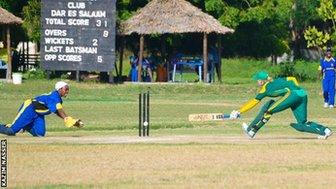
Tanzania's women in action against South Africa
The result was not only women who stayed in the sport, but women who went into higher education and employment and are now comfortable financially, with some female players earning five times as much as the lowest paid women in Tanzania.
Kazim, who is now an administrator with the cricket association, said: "When girls reached 13-14, they start struggling in life because many of the women come from single parent families.
"It becomes a challenge, because the parent will force the girls to find alternative employment.
"We have spent five years with them so we try and do what is best for them.
"We train them so they get employment instead of going to work as house maids."
Zully added: "The parents could not take them [the girls] for further studies.
"We as an association tried to give them classes and pay the school fees. We tried our best to help them to ensure they have better lives in the future.
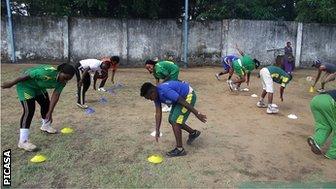
Tanzanian women are helped outside of the sport in the hope that they keep playing.
"When you see any local girl or any boy play cricket, their whole attitude is completely different than other people. They are very disciplined.
"When I started going to the schools and I started this programme, I said I must help them as much as I can.
"It has become a dream for me. If I can change the lives of one or two people before I depart this life I will be the happiest person in the world."
Mwanaidi Ibrahim is one whose life has been helped by cricket.
The 27-year-old all-rounder has been playing the sport since she was 12, and now stars for the national team.
Through a translator, she said: "When I was between 15 and 19, the game kept me focused.
"To remain, we had to stick to the training schedule and that helped us during that difficult phase.
"My family comes from a poor background. Without cricket, I would be nowhere. Life would be very tough. I am focussed and having a good life."
Ummy Herry, meanwhile, is a 15-year-old who is currently playing in the national side's Under-19s, and dreams of being a cricketer and a lawyer.
She said: "Once I finish school, there will be a lot of challenges. Taking in consideration the scarce resources and availability of employment, I feel cricket will guide me through.
"The parents of my friends are depending on them to work. They lose their childhood."
BBC presenter Mark Beaumont will meet some of the stars of Tanzanian cricket this weekend as part of his journey around the Commonwealth following the Queen's Baton Relay.
The baton is a symbol of the Commonwealth and its Games and is in Tanzania this weekend as part of its voyage around the 70 nations and territories that make up the organisation.
The story of Tanzanian cricket is the latest he will encounter after meeting inspirational figures in boxing, lawn bowls, athletics and football.
For Zully, a lot of work still has to be done to develop cricket in the country but one main dream occupies his mind.
"The day I see them at the World Cup, God has fulfilled my wishes and dreams."
In 1975, Tanzanians did appear at the World Cup as part of an East Africa team, external with Kenya, Uganda and Zambia. For Tanzania to compete at a World Cup on its own, the development will need to continue for a long time to come. But what is sport without dreams?
- Attribution
- Published16 January 2014
.jpg)
- Attribution
- Published15 January 2014
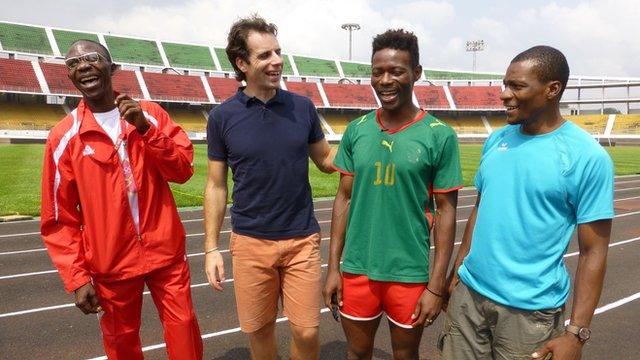
- Attribution
- Published13 January 2014
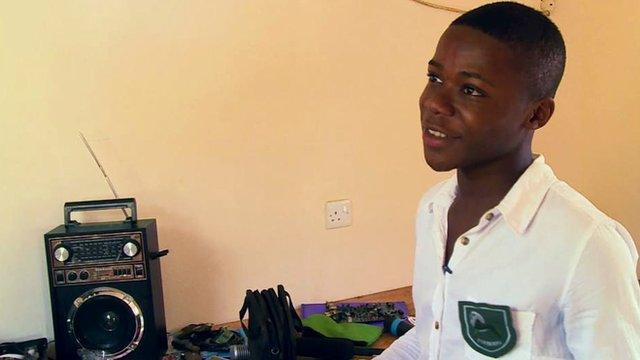
- Attribution
- Published9 January 2014
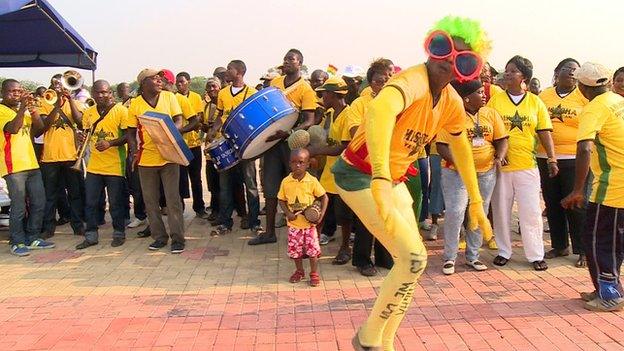
- Attribution
- Published3 January 2014

- Published18 October 2019
